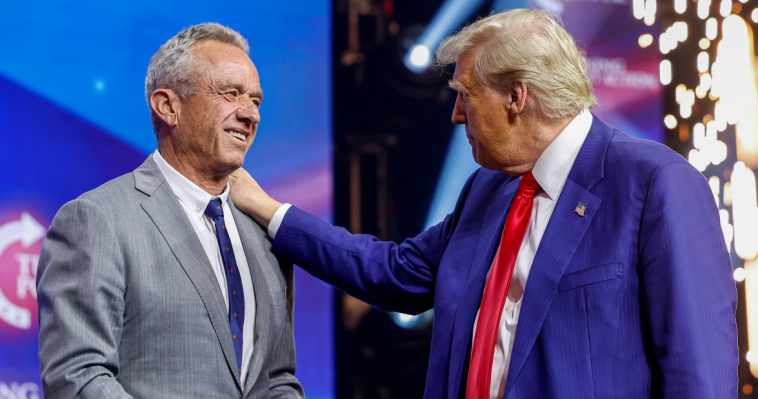President-elect Donald Trump announced on Thursday that he has selected Robert F. Kennedy Jr. to serve as the Secretary of Health and Human Services (HHS), signaling a major shift in healthcare policy. Kennedy, a former third-party presidential candidate who dropped out and endorsed Trump, has been a vocal critic of the pharmaceutical industry and current public health practices.
In a statement, Trump praised Kennedy’s commitment to tackling issues within the healthcare system. “I am thrilled to announce Robert F. Kennedy Jr. as the United States Secretary of Health and Human Services (HHS),” Trump said. “For too long, Americans have been crushed by the industrial food complex and drug companies who have engaged in deception, misinformation, and disinformation when it comes to Public Health. The Safety and Health of all Americans is the most important role of any Administration, and HHS will play a big role in helping ensure that everybody will be protected from harmful chemicals, pollutants, pesticides, pharmaceutical products, and food additives that have contributed to the overwhelming Health Crisis in this Country. Mr. Kennedy will restore these Agencies to the traditions of Gold Standard Scientific Research, and beacons of Transparency, to end the Chronic Disease epidemic, and to Make America Great and Healthy Again!”
Trump’s decision to nominate Kennedy is seen as a bold move, with the president-elect promising to give him substantial autonomy over healthcare policy. “He’s going to help make America healthy again. … He wants to do some things, and we’re going to let him get to it,” Trump said during his victory speech, referencing Kennedy’s “Make America Healthy Again [MAHA]” initiative. “Go have a good time, Bobby.”
If confirmed, Kennedy will oversee a broad range of regulatory bodies, including the Centers for Disease Control and Prevention (CDC), the National Institutes of Health (NIH), the Centers for Medicare & Medicaid Services (CMS), and the Food and Drug Administration (FDA). His influence could lead to significant changes in how these agencies approach public health and safety regulations.
Kennedy’s nomination comes with potential policy shifts, especially given his controversial stances on several public health issues. He has been a vocal critic of the current childhood vaccination schedule, fluoride in drinking water, and the widespread use of processed vegetable oils. Kennedy has argued that fluoride, commonly added to drinking water to promote dental health, poses significant risks, describing it as “an industrial waste associated with arthritis, bone fractures, bone cancer, IQ loss, neurodevelopmental disorders, and thyroid disease.”
Kennedy has also taken aim at seed oils, such as canola oil, corn oil, and sunflower oil, referring to them as “poison” due to their highly refined production processes. His views suggest a push for stricter regulations on food additives and a potential overhaul of dietary guidelines promoted by federal agencies.
The nomination has already sparked reactions from lawmakers. Sen. Bill Cassidy (R-LA), the ranking member of the Senate Health, Education, Labor, and Pensions (HELP) Committee, welcomed the opportunity to learn more about Kennedy’s policy priorities. “RFK Jr. has championed issues like healthy foods and the need for greater transparency in our public health infrastructure,” Cassidy said. “I look forward to learning more about his other policy positions and how they will support a conservative, pro-American agenda.”
Kennedy’s appointment could signal a dramatic departure from the current approach to public health and safety, focusing more on holistic measures and increased scrutiny of pharmaceutical and food industries. His nomination sets the stage for a heated confirmation process, as his views on vaccines and food safety may face strong opposition from both parties.
As Trump’s new administration takes shape, Kennedy’s influence over HHS could lead to a major realignment of public health priorities, emphasizing greater transparency and stricter regulation of substances deemed harmful to Americans’ health. His vision for a healthier America aligns with Trump’s broader goals, promising significant changes to healthcare policy in the years ahead.


